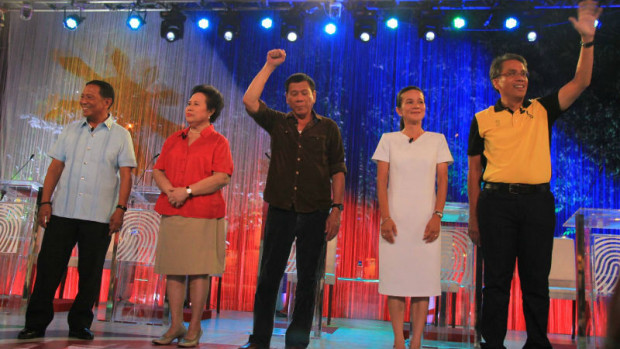
Five candidates, one stage, one elections for the future of 100 million Filipinos.
Photo by Inquirer Volunteer Gail Mejia | University of Pangasinan
Monday’s Philippine presidential election to replace Benigno Aquino III is likely to turn on five key issues that candidates agree weigh on the minds of many of the nearly 55 million voters:
Crime
Popular anxiety over Filipinos’ personal safety has pushed tough-talking Rodrigo Duterte to the top of the polls. The nation has been troubled for decades by Muslim and communist insurgencies, Islamist militants, clogged courts and a corrupt police force.
Duterte has pledged to apply his success fighting crime as mayor of the major southern city of Davao, in which vigilante death squads are accused of killing hundreds of petty criminals during his two-decade rule, to the rest of the country.
Poverty
President Aquino delivered six percent annual economic growth while in office and won international plaudits for helping to improve the fortunes of a nation long known as one of Asia’s basket cases.
However one in four Filipinos still live on less than $1.30 a day, little changed from when he came to power in 2010. Millions still go abroad, away from their families, to find decent-paying work.
A devastating rich-poor divide has worsened, and Duterte has hypnotised millions of Filipinos with vows to take on the elite that control the economic levers.
Rebellions
The Philippines is plagued by two of Asia’s longest-running insurgencies. The rebellions by separatist Muslim rebels and communists, have killed tens of thousands of people, and they continue to claim dozens of lives each year.
Aquino failed to secure peace on either front, although he did get close with the Moro Islamic Liberation Front, the biggest Muslim rebel group.
All major presidential candidates have vowed to pursue peace, but with varying plans.
Service breakdown
Manila’s commuters suffer some of the world’s longest and most tortuous commutes as packed roads and trains have crumbled after decades of under-investment, neglect and corruption, while other basic services are faring little better.
The better-funded Aquino government’s efforts to catch up on infrastructure spending were hampered by frequent project delays, not helped by courts that have been criticised for interference.
Corruption
Berlin-based Transparency International ranked the Philippines the 95th least corrupt out of 168 countries in its 2015 global corruption perceptions index. This was 39 places better than its 134th ranking when Aquino came to office in 2010.
But even though Aquino had predecessor Gloria Arroyo arrested and put on trial for vote fraud and graft, critics say he has barely scratched the surface and that bribes are still the fastest way to get any business done.
RELATED STORIES
10 events that define President Aquino’s legacy
Key facts on Philippine elections